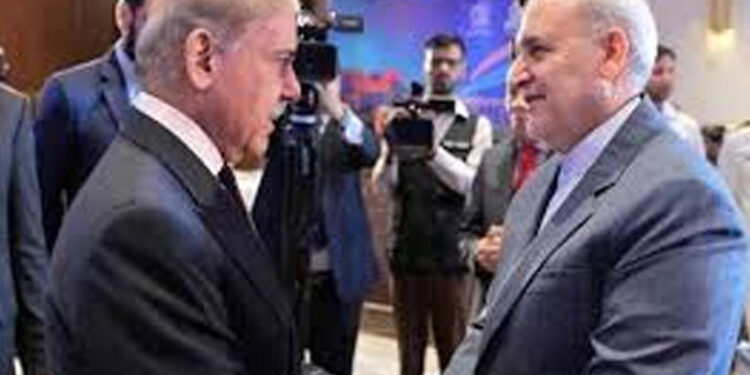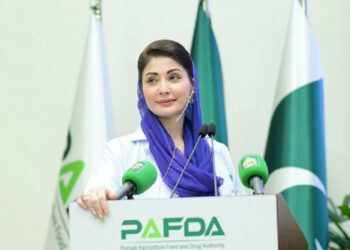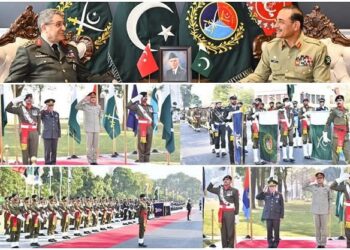Islamabad – In a significant diplomatic development amidst intensifying geopolitical tensions in the Middle East, Iranian Ambassador to Pakistan Reza Amiri Moghadam held a high-level meeting with Prime Minister Shahbaz Sharif at the Prime Minister’s House in Islamabad. The meeting comes ahead of a scheduled session of Pakistan’s National Security Committee (NSC), highlighting the urgency and gravity of the unfolding Iran-Israel conflict and its implications for regional peace and security.
Key Issues Discussed: Peace, Stability, and Diplomacy
During the meeting, both sides engaged in detailed discussions about the rapidly evolving situation in the Middle East, particularly the escalating conflict involving Iran, Israel, and the United States. According to diplomatic sources, Ambassador Amiri provided a comprehensive briefing to Prime Minister Shahbaz Sharif on Iran’s position regarding the ongoing hostilities, which have raised alarm across the international community.
The Prime Minister reaffirmed Pakistan’s long-standing commitment to peace, regional stability, and conflict resolution through dialogue and diplomacy. Emphasizing Islamabad’s principled foreign policy, Shahbaz Sharif reiterated that Pakistan advocates for restraint by all parties involved and supports efforts for a peaceful resolution to the crisis.
Rising Tensions in the Middle East: Context and Consequences
The meeting comes at a critical time, as tensions between Iran and Israel have escalated following a series of aerial strikes, cyberattacks, and military mobilizations. Israel has reportedly targeted Iranian nuclear and military infrastructure in recent days, while Iran has vowed to retaliate against what it describes as acts of unprovoked aggression.
The situation has been further complicated by the involvement of the United States, which has expressed support for Israel while simultaneously calling for de-escalation. The U.S. administration has confirmed that it carried out military actions targeting Iranian facilities, raising fears of a broader regional conflict.
This backdrop has made diplomatic engagement between Pakistan and Iran particularly crucial, especially given Pakistan’s strategic location, historical ties with both Iran and Gulf countries, and its role in the Organization of Islamic Cooperation (OIC).
Pakistan’s Role as a Regional Peace Advocate
Pakistan, under the leadership of Prime Minister Shahbaz Sharif and Foreign Minister Ishaq Dar, has repeatedly emphasized the importance of regional peace and cooperation. The country has a longstanding policy of neutrality in Middle Eastern conflicts, advocating instead for dialogue among Muslim nations and constructive engagement with the West.
In his conversation with Ambassador Amiri, Prime Minister Shahbaz Sharif is reported to have reaffirmed Pakistan’s readiness to facilitate diplomatic channels aimed at defusing tensions. He emphasized that any military conflict between regional powers would not only destabilize the Middle East but could also have far-reaching consequences for South Asia, especially in terms of security, economic stability, and refugee movements.
Importance of the National Security Committee (NSC) Meeting
The timing of the ambassador’s meeting is also noteworthy because it precedes the upcoming session of Pakistan’s National Security Committee (NSC), which is the highest civil-military decision-making body in the country on national and international security matters.
Officials suggest that the Iran-Israel conflict and its regional ramifications will be among the key topics of discussion at the NSC meeting. Other issues likely to be reviewed include the security of Pakistan’s western border, internal security preparedness, and economic vulnerabilities stemming from geopolitical instability.
Pakistan’s military and intelligence agencies are closely monitoring the regional security landscape, particularly the implications of any further escalation between Iran and Israel, which could impact Pakistan’s own national interests, trade routes, and relations with Middle Eastern nations.
Iran’s Diplomatic Offensive Amid Rising Pressure
The visit by the Iranian ambassador to the Prime Minister’s Office is part of a broader diplomatic effort by Tehran to rally support from neighboring and friendly nations. Iran has intensified its outreach to countries such as Pakistan, Turkey, and China to explain its position and garner regional solidarity against Israeli aggression and American involvement.
In a statement issued by the Iranian Embassy in Islamabad after the meeting, Ambassador Reza Amiri Moghadam emphasized the “brotherly relations” between Iran and Pakistan and appreciated Pakistan’s consistent position on the need for peaceful conflict resolution.
He noted that Iran values Pakistan’s role as a peace advocate in the region and is keen to work together on platforms like the OIC and the United Nations to mobilize international opinion against aggression and in favor of diplomacy.
Global Reaction to Iran-Israel Conflict
The international community has expressed deep concern over the growing confrontation between Iran and Israel. Several global powers, including China, Russia, and the European Union, have urged restraint and offered to mediate between the parties. The United Nations Secretary-General, Antonio Guterres, has also called for an immediate ceasefire and has warned against actions that could lead to a wider war.
Meanwhile, in Washington, political voices remain divided. While the U.S. administration continues to support Israel’s right to self-defense, there is growing pressure from lawmakers and civil society groups urging President Donald Trump to prevent a regional war and prioritize diplomacy over military solutions.
Domestic and Economic Implications for Pakistan
For Pakistan, the conflict poses not just geopolitical risks but economic and energy-related challenges as well. The Middle East remains Pakistan’s primary source of oil and gas imports, and any disruption in Gulf shipping lanes due to military activity could lead to spikes in energy prices, inflation, and trade disruptions.
Additionally, Pakistan hosts a large expatriate workforce in Gulf countries, including Iran, Saudi Arabia, and the UAE. A military conflict in the region could endanger the lives of millions of overseas Pakistanis and lead to remittance shocks that are vital for Pakistan’s fragile economy.
Conclusion: A Diplomatic Tightrope
The meeting between Iranian Ambassador Reza Amiri Moghadam and Prime Minister Shahbaz Sharif underscores Pakistan’s carefully balanced diplomatic posture in a time of crisis. While reaffirming support for peaceful resolutions and regional stability, Islamabad continues to position itself as a neutral party capable of constructive engagement with all sides.
As the region teeters on the edge of further conflict, Pakistan’s diplomatic efforts and multilateral engagements — especially through platforms like the OIC and the UN — will play a crucial role in shaping outcomes. The upcoming National Security Committee meeting is expected to further clarify Pakistan’s official stance and strategies in the face of a rapidly evolving regional crisis.

























